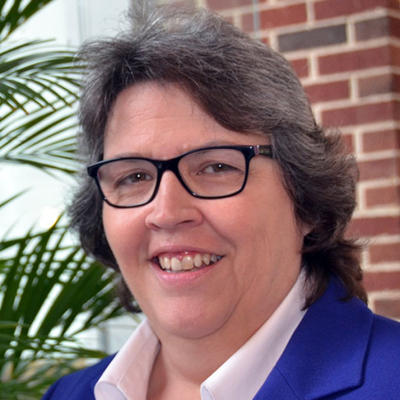Laura Linnan: Influential public health scholar and leader in Total Worker Health® research
January 4, 2024
By Audrey Smith

Dr. Laura Linnan
Laura Linnan, ScD, is the senior associate dean for academic and student affairs at the UNC Gillings School of Global Public Health. She has spent more than 40 years as a practitioner and researcher who engages with the intended beneficiaries of her work while striving to eliminate inequities in chronic disease and other health effects.
In her research, she examines how social settings, such as libraries, beauty salons, barbershops and churches, influence the health of individuals who frequent these locations and how to create policies, practices, programs and conditions that can promote health and well-being. She focuses on the workplace setting — specifically, the influence of work and working conditions on safety, health and well-being.
“More than 60% of American adults work and spend a considerable portion of their waking hours working. Work is a social determinant of health that exerts an important direct influence on the health and well-being of employees,” said Linnan, who is also a professor of health behavior at the Gillings School and the director of the Carolina Center for Healthy Work Design and Worker Well-Being, one of ten national centers of excellence in Total Worker Health® (TWH) funded by the National Institute of Occupational Safety and Health. “As a result, a focus on work, worker health and the conditions of work are important for public health interventions and research that our center is designed to address.”
She recently spoke about this topic with TIME, where she emphasized the important role that workplace conditions play in health outcomes.
Linnan has been a leader in the workplace health and well-being movement. She has led two CDC-funded, nationally representative employer surveys and consulted with numerous companies in developing TWH interventions. In 2021, Linnan also became the director and principal investigator at the Carolina Center for Healthy Work Design and Worker Well-Being, which is home to an interdisciplinary team of researchers who collaborate on research, outreach, education and advocacy activities.
The center launched with two research studies – one focused on reducing injuries among firefighters and one focused on minimizing burnout among nurses and physicians amid the COVID-19 pandemic. Several affiliated research projects are underway, including an intervention to increase access to healthy food options among blue-collar workers; reducing stigma, improving health and creating job pathways for socioeconomically disadvantaged women; and several pilot projects for early career investigators from UNC Charlotte and UNC Greensboro. Another study recently funded by the Center for Construction Research and Training is seeking to understand and address the disproportionately higher rates of injuries and fatalities among Hispanic construction workers.
Linnan oversees the Gillings School’s graduate certificate program in TWH – a three-course, nine-credit certificate that trains students from diverse disciplines (e.g. business, health behavior, industrial hygiene, safety, health policy) to become leaders of corporate, non-profit and government positions designed to promote and protect worker health and well-being. This certificate is also available for non-degree working professionals who want to add this training in an emerging field to their skill set.
Linnan also led two large national surveys which have served as benchmark data for monitoring changes in employer reports of efforts to improve worker safety, health and well-being. The 2017 Workplace Health in America Survey demonstrated that single-focused programs, such as those intended to help employees manage stress, are very common but are unlikely to make lasting impacts on worker health and well-being. When these single-focused programs also consider the work conditions that are driving stressful situations at work and intervene to change those conditions, that has the best chance of making real improvements in health outcomes. This reflects the TWH approach, where the actual work and working conditions that drive poor health are part of the solution for improving worker health.
“For example, if we offer a stress management program for staff at a busy hospital emergency room unit but we don’t consider addressing the staff shortage — or the pace of work, or the norms about how to work effectively as a team, or improving supervisor interactions with workers — it is unlikely that employees will experience improved health,” Linnan explained. “When we consider the work-related drivers of stress and intervene to address the root cause of the stress, that can have lasting health impacts.”
In March 2023, Linnan was interviewed by the editor of the American Journal of Health Promotion to explain how a TWH approach can lead to these lasting impacts.
Supporting workers – and collaborating alongside them to find solutions that are most practical for their needs – pays dividends. Findings from her TWH research show that when workplaces give their employees a voice and create better conditions, especially for those who earn low wages or work in hazardous environments, everyone benefits. This includes employee families, customers and organizational partners.
In 2023, Linnan was also honored as one of the 10 most influential women scholars in health promotion. This award seeks to celebrate women whose research and scholarship has proven to “support governments, communities and individuals to cope with and address health challenges.”
“What means the most to me about this honor is that I was nominated by my peers,” said Linnan. “I came to Carolina excited to contribute to the training of public health students while continuing to do research that makes an impact on worker health and safety. I’m thrilled that now, 24 years later, I still get to do both every day. This award acknowledges that my contributions to our academic mission and to this emerging field of total worker health have had a positive impact among many wonderful women scholars in public health.”
Contact the UNC Gillings School of Global Public Health communications team at sphcomm@unc.edu.
